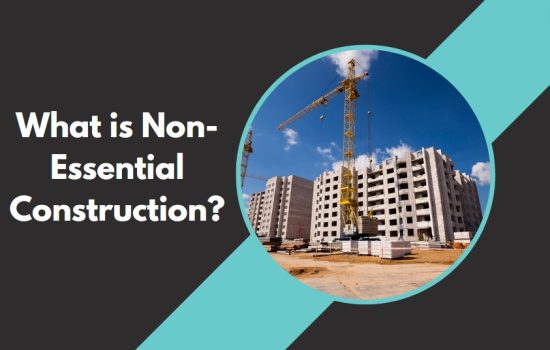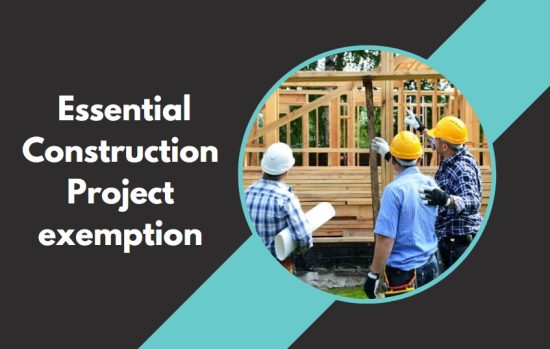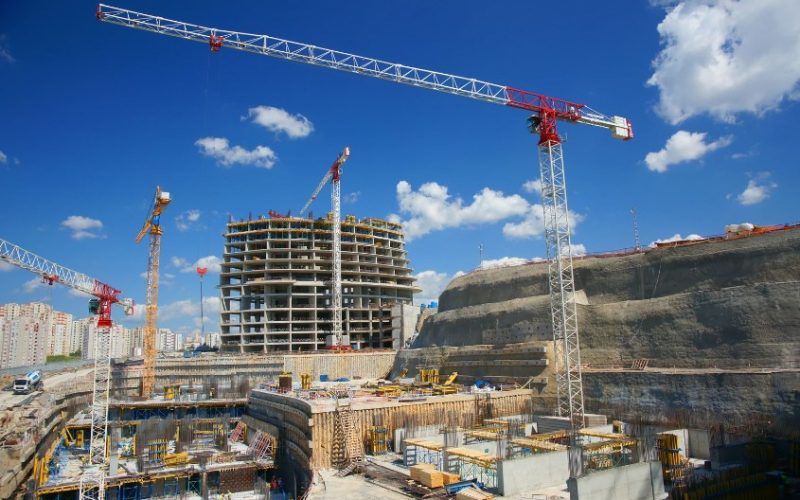Are you wondering what non-essential construction is in Ontario? With the current pandemic situation, many people are confused about what construction work is allowed to continue and which ones are not. The term “non-essential” might be a bit confusing, but it’s crucial to understand its meaning and restrictions before starting any project. In this blog post, we’ll dive into everything you need to know about non-essential construction in Ontario, including when it’s permitted, the regulations surrounding it and how to apply for an exemption if necessary. So let’s get started!
What is Non-Essential Construction in Ontario?

Non-essential construction refers to any project that is not deemed necessary for the maintenance, safety or operation of a building or structure. This includes projects such as home renovations, landscaping work and new commercial buildings.
During the COVID-19 pandemic in Ontario, non-essential construction was initially shut down to limit the spread of the virus. However, as restrictions have eased up over time, some non-essential construction has been allowed to resume under certain conditions.
It’s important to note that even if your project is considered essential or permitted under current regulations, you must still follow strict health and safety protocols on-site. Penalties and fines may apply if this is not done.
If you’re unsure whether your project falls under essential or non-essential construction categories, it’s best to consult with local authorities before starting any work. Being informed can help avoid potential setbacks and ensure that your project runs smoothly from start to finish.
When is Non-Essential Construction Work Permitted?
In Ontario, non-essential construction work is generally not allowed during a state of emergency or a stay-at-home order. However, there are some exceptions where the government has permitted certain types of non-essential construction to continue.
- Construction projects related to healthcare facilities, transportation and critical infrastructure are considered essential and can proceed even during lockdowns. Additionally, residential construction that began before January 12th, 2021 is also allowed to continue as long as it complies with safety protocols.
- Other than these exceptions, non-essential construction projects such as office buildings, hotels or shopping malls must halt operations until further notice. The government strictly enforces this measure to curb the spread of COVID-19 by limiting unnecessary interactions among people.
- It’s important for employers and employees involved in constructing activities to follow all guidelines set forth by the authorities regarding health and safety measures. Failure to comply with regulations can result in hefty fines or legal penalties being imposed on individuals or organizations found guilty of violating orders related to non-essential construction activity during times when they’re not permitted.
What is Allowed Under Non-Essential Construction?

Non-essential construction projects are those that have been deemed non-critical to sustaining infrastructure or essential services. As a result, the government of Ontario has implemented restrictions on these types of construction projects during the COVID-19 pandemic.
- Under non-essential construction, certain activities are still permitted. These include safety work such as inspections and repairs to critical systems like fire suppression and alarm systems. Construction work related to healthcare facilities, temporary structures for emergency response purposes, and residential renovations where a family member requires medical attention is also allowed.
- However, any other project that does not fit within these categories is prohibited under current regulations. This includes commercial buildings, recreational facilities, hotels and motels unless they are being used for emergency housing purposes.
- It’s important to note that while some activities may be allowed under non-essential construction rules in Ontario; it’s crucial to ensure compliance with all regulations before proceeding with any work on your property or project site.
Types of Non-Essential Construction Projects
Various types of non-essential construction projects are not permitted at this time in Ontario. These include projects such as new residential or commercial buildings, renovation work on existing buildings, and landscaping projects.
- New construction projects for parks and recreational facilities are also considered non-essential under the current regulations. This means that any plans to build a new park or recreational facility must be put on hold until further notice.
- Other types of non-essential construction projects include swimming pool installations, deck constructions, and other outdoor home improvement projects. While these may be important to homeowners, they do not fall under the essential category outlined by the government.
- It’s important to note that while certain types of construction may be classified as non-essential during this time, it doesn’t mean they won’t be allowed in the future. As restrictions are lifted and guidelines change, some of these projects may become permissible once again.
- It’s vital to stay up-to-date with local guidelines and regulations regarding non-essential construction so you can make informed decisions about your own home improvement needs.
The Regulations and Restrictions of Non-Essential
The regulations and restrictions surrounding non-essential construction in Ontario are important to understand for anyone carrying out construction work. The province has implemented strict measures to reduce the spread of COVID-19, including limiting certain types of construction.
Under these regulations, non-essential construction is only permitted if it is necessary for the maintenance or safety of an existing residential building or structure. This means that any new development projects or renovations must be put on hold until further notice.
In addition, all sites must adhere to a set of guidelines aimed at preventing transmission of the virus. These include regular cleaning and disinfecting of common areas and surfaces as well as providing appropriate personal protective equipment (PPE) for workers when required.
Enforcement officers have been given authority under the Emergency Management and Civil Protection Act to ensure compliance with these regulations, including issuing fines or even shutting down sites that do not comply.
Those involved in non-essential construction projects need to stay up-to-date with any changes to these regulations to avoid penalties and contribute to stopping the spread of COVID-19 in Ontario.
What are the Penalties for Carrying Out Non-Essential Construction?
Non-essential construction work carries heavy penalties in Ontario. The government has made it clear that non-essential projects are not to be taken lightly, and those who violate the restrictions will face consequences.
- The fines for carrying out non-essential construction can range from $750 to $100,000 for individuals and up to $10 million for corporations. These hefty fines are meant to deter people from breaking the rules and endangering public health.
- In addition, contractors or builders involved in non-essential construction could risk losing their licenses, which would prevent them from participating in future projects. This puts their livelihood at stake and is another layer of punishment.
- It’s important to note that workers involved in non-essential construction may also face consequences such as job loss or a damaged reputation within the industry.
- Violating non-essential construction regulations can have serious repercussions on both an individual and corporate level. Everyone must follow these guidelines to ensure public safety during this pandemic.
How to Apply for an Essential Construction Project exemption?

If you’re a construction worker or business owner in Ontario and believe that your project falls under the essential category, you can apply for an exemption to continue working.
- To apply for an Essential Construction Project exemption, you’ll need to provide detailed information about your project. This includes the location, scope of work, number of workers required on-site, and how long the project will take.
- You’ll also need to demonstrate why your project is essential and cannot be postponed until after COVID-19 restrictions are lifted. Examples of essential projects include healthcare facilities, transportation infrastructure, and critical municipal services.
- Once you have gathered all necessary information and completed the application form provided by the government website or local authorities responsible for issuing exemptions in your area if any – which may vary depending on where within Ontario you reside – submit it as soon as possible.
- The process for obtaining an exemption can take some time due to high demand; therefore submitting complete documents ahead of deadlines is crucial. Individuals must follow guidelines properly when applying so they don’t risk being subject to penalties if their request is denied.
Conclusion
Gaining an understanding of what constitutes non-essential construction in Ontario is imperative for any contractor or business owner. It is vital to be aware of the regulations and restrictions that were set by the government during a state of emergency. Although certain kinds of projects are limited, essential building work can progress uninterrupted. Non-essential construction owners must apply for an exemption if they desire to resume their operations. People should also bear in mind that penalties can be hefty if non-permitted work is done without official consent, so it is best to get advice from a legal expert or the provincial government before moving ahead with such kind of venture. We can all do our part to keep both ourselves and others safe while permitting essential activities across different sectors by adhering to the provincial guidelines and tracking updates about COVID-19 protocols.
FAQs on what is non essential construction in ontario
1. Is construction considered essential in Ontario?
The term “residential construction activities or projects and related services” refers to all residential development, which is now approved.
2. What is the capacity for non essential retail in Ontario?
Non-essential retail inside a mall (with no external access) remains closed. Non-essential retail with an external facing door may reopen at 15% capacity (which is calculated by dividing the unincumbered sales floor by 26.67m2 or 287 sq ft).
3. What is non essential retail?
Non-essential retail, at its heart, describes companies that offer products or services that are not seen as necessities by the general public.










